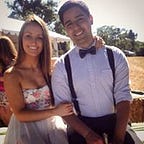Comedians Perform in Honor of “Charlie Hebdo” Shooting Victims
The Harmony Gold Theater in Hollywood hosted a unique stand-up comedy show in February, with a diverse line-up of comedians from Muslim, Jewish and other backgrounds performing in a tribute to the victims of January’s terrorist attacks in Paris.
The show, entitled “Je Suis Charlie, Je Suis Ahmed, Je Suis Yoav” in honor of three victims of the attacks, was produced by the Levantine Cultural Center of Los Angeles, which aims to foster peaceful discourse among the various religions and cultures of the Middle East.
Jordan Elgrably, the center’s executive director and co-founder, organized the show as a tribute to peace and free speech in the wake of attacks that killed 17 people at the offices of French satirical magazine Charlie Hebdo and a kosher supermarket in Paris. The magazine was notorious for pushing the boundaries of satire by publishing controversial cartoons, including several caricatures of the Muslim prophet Muhammad.
The show was a special edition of Sultans of Satire: Middle East Comic Relief, a stand-up comedy series started 10 years ago by Elgrably and the Levantine Cultural Center to promote Middle Eastern unity by using stand-up comedy to bring people together.
“After Sept. 11 there was a growing sense of anti-Muslim and anti-Arab feelings in the U.S.,” Elgrably said. “Sultans of Satire was a way of uniting people and turning to humor instead of violence or vitriol.”
Jordan’s brother Noel Elgrably, a Los Angeles-based Jewish comedian of Moroccan and Israeli descent, hosted the night’s performances. He said last month’s terrorist attacks also represented an attack on free speech, because the Charlie Hebdo employees were killed for what they published in their magazine.
“I think the Charlie Hebdo incident was particularly shocking to people all around the world because it’s an infringement on our freedom of speech,” Noel said. “We take it for granted, but if you’re anywhere else in the world, you may not have that freedom. It puts you in the shoes of those people where you’re like, hey, this is dangerous, and now you can’t say or write what you want. Somebody’s going to die over a picture?”
Noel is a regular performer at several Los Angeles comedy clubs, and he was a member of the Axis of Evil Comedy Tour, a group of Middle Eastern comedians that gained national fame with a Comedy Central televised special in 2007.
After Jordan founded the Levantine Cultural Center in 2001, he began to talk to Noel about the benefits of using humor to battle fear and prejudice. The Elgrably brothers both agreed that humor could be used as an effective tool for different cultures to understand one another.
“You want to avoid things like Charlie Hebdo. You want to avoid incidents where fear of another culture or race or religion is met with violence,” Noel said. “You want to be able to bridge the gap and say, ‘You’re like this, and we’re like this. We don’t have to agree, but we don’t have to fight either.’”
Noel explained that in his experience, comedy can diffuse the tension from otherwise controversial topics like religion and race and make them lighter and easier to talk about.
“When I’m with other comics — Jewish, Muslim, Catholic, whatever — we’re just busting jokes on each other, talking about our cultures, our religion, and it’s the easiest going thing in the world,” he said. “I don’t think we’re that far removed from each other. Levity is a big factor in that. I think any time you can make people laugh, you share a bond.”
The comedians were not hesitant to test their boundaries and joke about controversial topics such as race and religion in their material on stage. Some of the audience’s most enthusiastic laughs came when Iranian-American comedian Amir Kamyab poked fun at several stereotypes of Middle Eastern people and cultures.
“There were 3,000 Middle Eastern people at my last show…one eyebrow,” Kamyab said, inciting laughter from the audience. “You don’t have to be a beauty specialist, just take care of that so it doesn’t connect.”
But the audience, which was mostly made up of middle aged Arab-Americans and Muslims, balked at a few of the more graphic jokes that included profanity and references to drugs, alcohol and sex.
“There were a few times where I thought they just went too far and lost me,” said Naseem Ibrahim. “But it was an event about free speech, so I guess it makes sense they’d be saying whatever they can.”
Mona Shaikh, a Muslim Pakistani comedian, did not shy away from joking about things like her marijuana use, despite the lukewarm reception from the crowd. Shaikh also runs a satirical website called MuslimsDoItBetter.com. She acknowledged that sometimes comedians have to take the limits of free speech to their extremes to illustrate a point.
“Especially after those attacks in France, we have to be even more fearless in what we say and do,” Shaikh said. “I myself have received multiple death threats because of what I’ve put on my website, but that can come with the territory.”
Several people at the show said that ultimately, the most important role of comedy was to allow them to forget about their worries for a bit and just laugh.
“We’re here to laugh, and that’s really what the medicine of life is,” Noel Elgrably said. “Laughter.”
